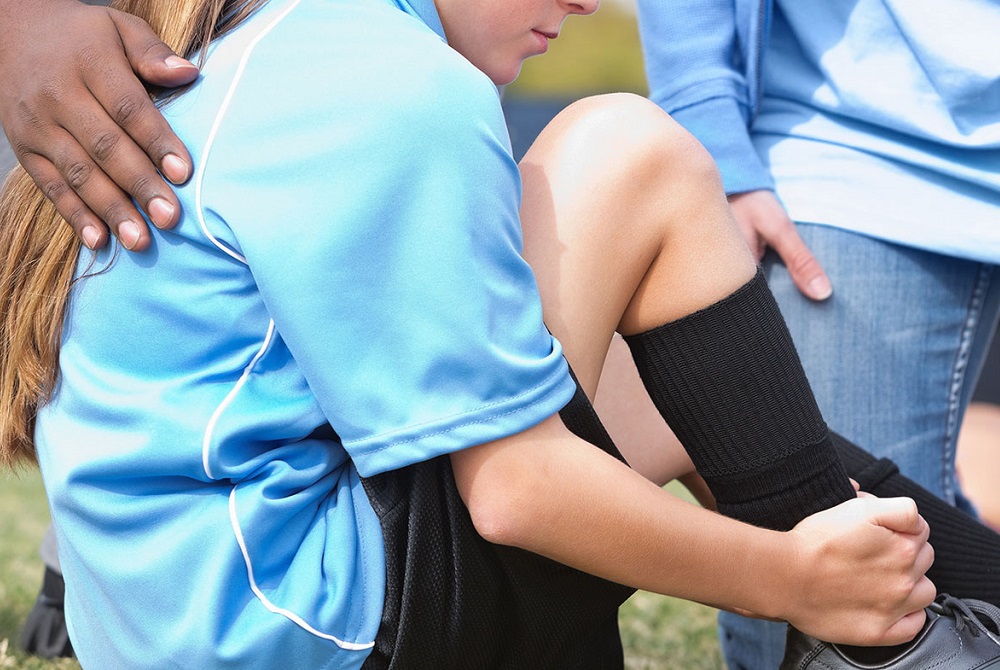
Is My Student Athlete's Pain More Than Just Growing Pains?
February 14, 2023
There are a few factors that can make student athletes prone to injury. They might be overusing their muscles (thanks to a more rigorous exercise regimen), and they might not yet have developed the proper technique for their sport.
 “These factors, combined with the fact that student athletes have growing bodies that they’re still getting used to—especially after a growth spurt — can make them more prone to injury,” says Nancy White, M.D., a sports medicine physician with Henry Ford Health System.
“These factors, combined with the fact that student athletes have growing bodies that they’re still getting used to—especially after a growth spurt — can make them more prone to injury,” says Nancy White, M.D., a sports medicine physician with Henry Ford Health System.
However, just because your child is feeling pain doesn’t necessarily mean they’ve sustained an injury. There is such a thing as growing pains, although the term may be misleading. “Most experts feel that growth itself does not cause pain,” says Dr. White. “The most likely reason for ‘growing pains’ is overuse of the muscles, causing pain and soreness after an activity.”
These growing pains typically occur at the front of the thighs, the back of the knees and the calves, she says, and occur commonly in the late afternoon, evening, or night. If your child is experiencing pain outside of these areas or times of day, it might not be growing pains — and it’s a good idea to get it checked out by a doctor.
Tell-Tale Signs That Pain Should Be Examined
If the pain goes away by the next day — if your child has rested during night and feels better the next morning — there’s no need for concern. But you should head to the doctor if:
► the pain is lingering into the next day.
► the pain is also accompanied by bruising, swelling or redness.
► the pain is so intense that they’re unable to put weight on their legs.
“In these cases, don’t wait — the longer you wait, the more dangerous the injury can become,” says Dr. White.
How Student Athletes Can Help Prevent Injuries
Encourage your child to take proper precautions and maintain healthy habits, all of which can lower the likelihood that they’ll sustain an injury. Dr. White recommends the following tips:
- Maintain proper technique. “Knowing and understanding the movements needed for whatever sport they practice is so important,” says Dr. White. “Figure skating and gymnastics are two sports where I tend to see injuries more often during growth phases. These athletes are often learning difficult skills at a time in their lives when they’re going through a growth spurt, and that combination can lead to injury.”
- Stretch before and after playing a sport. “Try dynamic stretching — where you’re actually moving while stretching — instead of static stretching, where you’re holding the stretch,” says Dr. White. “Dynamic stretching is a great warm up. It can help improve flexibility and reduce the risk of injury.”
- Strength train, especially in the core and limbs. Doing so will help create stable, strong muscles to keep the body properly aligned and lessen the chances of injury.
- Eat a balanced diet and stay hydrated. While it’s normal for kids to have sugar every once in a while, filling the bulk of their diet with plenty of water, fresh fruits and vegetables, healthy protein, fats and carbohydrates will help them function to their best ability.
- Get enough rest each night. Sleep is necessary for health and well-being in general, but when it comes to athletes, rest is incredibly important to help their bodies recuperate. In general, kids need about 10 hours of sleep per night. So if your child plays a sport, you want to really be sure that they’re hitting that 10-hour mark, says Dr. White.
Dr. Nancy White is a sports medicine physician with Henry Ford Health System. She sees patients at Henry Ford Medical Center – Columbus in Novi, and Henry Ford Medical Center — Bloomfield Township.
Want to learn more? Henry Ford Health System sports medicine experts are treating the whole athlete, in a whole new way. From nutrition to neurology, and from injury prevention to treatment of sports-related conditions, they can give your athlete a unique game plan. To find a sports medicine physician at Henry Ford, visit henryford.com or call 1-800-436-7936.

Wake Up And Walk! 7 Benefits Of Taking A Morning Stroll
By
Nick Parkinson, M.Ed., AT, ATC, TSAC-F
Henry Ford Health
May 3, 2022
 Still having difficulty fitting exercise into your day? Start by heading out for a morning walk.
Still having difficulty fitting exercise into your day? Start by heading out for a morning walk.
No matter your fitness level, walking offers tremendous benefits, including improving your mood, managing your weight, increasing your energy and reducing your risk for disease. All you need is a good pair of walking shoes and a place to stroll.
7 Benefits Of A Morning Walk
Starting your day with a morning walk helps you check something important off your daily to-do list – your fitness.
Even if you only have time for a 10-minute walk each morning, you’ll have up to 70 minutes of exercise by the end of the week. And any type of movement that you add in later in the day, whether it’s taking the stairs or walking to your car at the far end of the parking lot, improves your overall health.
Morning walks offer many benefits, helping to:
Boost your inner athlete. Taking a morning walk boosts your stamina, flexibility and energy. As your fitness improves, you’ll be able to move through your daily activities more easily.
Improve your mood. Getting outside gives you a chance to enjoy fresh air and nature. Walking, like any form of exercise, reduces stress and anxiety. You’ll start the day with a positive attitude, better able to manage challenges during the day.
Increase your productivity. After a morning walk, you feel energized and ready to take on the day. Starting your day with physical activity improves your concentration and productivity.
Keep you standing tall. Many of us are sitting at work or school for several hours each day, often without watching our posture. Walking with your shoulders back and head held up improves posture. Walking also improves your core muscles, which help support your spine.
Manage your weight. After a full night’s sleep, walking helps jump-start your metabolism, allowing you to burn calories at a faster rate. Along with a healthy diet, walking can help manage weight.
Reduce your risk for disease. A regular walking routine can reduce your risk for diabetes, heart disease, hypertension (high blood pressure), obesity and some cancers.
Strengthen your bones. Our bodies are constantly making new bone and breaking down old bone. After age 50, we lose bone mass as our bodies break down old bone at a faster rate. Along with a healthy diet, weight-bearing exercise like walking strengthens your bones and reduces your risk for osteoporosis.
How To Start Your Morning Walk Routine
Keep these strategies in mind as you plan your morning stroll:
Eat a light snack before you walk. After sleeping all night, it’s helpful to eat a light snack or breakfast before heading out the door. Toast with almond butter or some yogurt with nuts and berries can give you the energy you need, especially if you’re planning a longer walk.
Check out different walking routes or events. On a busy morning, you may choose to walk close to home to save time. When your schedule permits, explore different neighborhoods, nature preserves or trails in your area. You may also want to check out local 5K races — many of these events welcome walkers.
Don’t forget to stretch. After walking, take a few minutes to stretch your leg muscles to work out any knots in your calves, hamstrings or thighs.
Increase impact with weights and intervals. As you build your stamina, boost the benefits of your walk by holding light weights or wearing a weighted vest. Try turning your walk into an interval training session by alternating between a fast and slow pace.
Prepare for the weather. To avoid falling on icy winter sidewalks, wear proper boots and spikes. Wear hats, scarves and gloves to protect your skin from frostbite. Wear a hat and sunscreen in the summer heat. Carry a water bottle to stay hydrated, especially on longer walks.
Schedule your morning walks. Add a morning walk to your calendar and keep the appointment. Over time, morning walks can become a habit you won’t want to give up.
Walk with a buddy. Find a walking partner who will hold you accountable for your commitment to exercise. To enjoy even more socializing as you walk, check out walking groups in your community.
To find a doctor at Henry Ford, visit henryford.com or call 1-800-436-7936.
Nick Parkinson, M.Ed., AT, ATC, TSAC-F Supervisor of Athletic Training with Henry Ford Sports Medicine, also leads Sports Performance training at the William Clay Ford Center for Athletic Medicine. He is a regular contributor to Henry Ford LiveWell. Learn more about Nick

